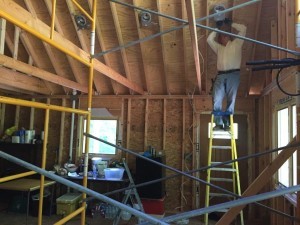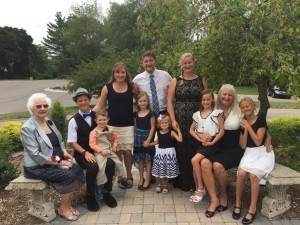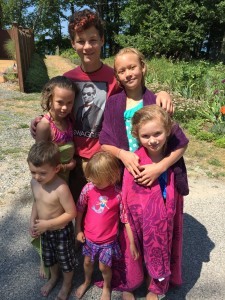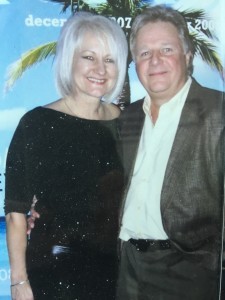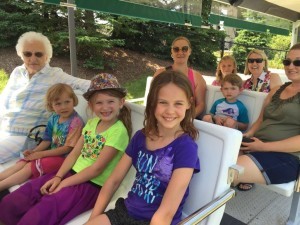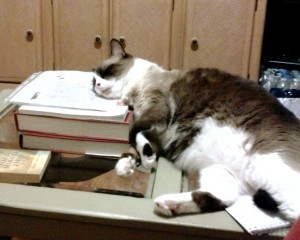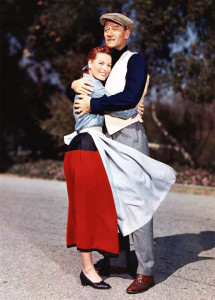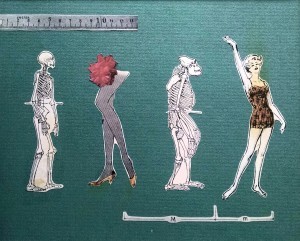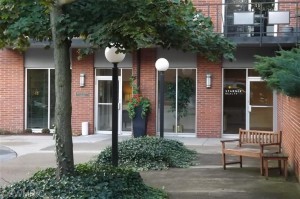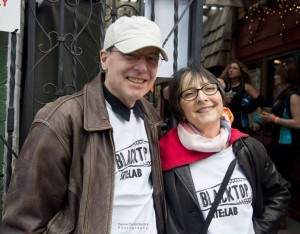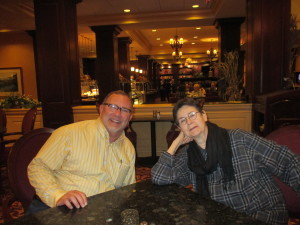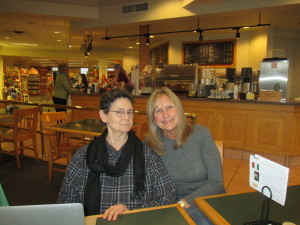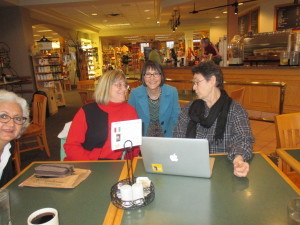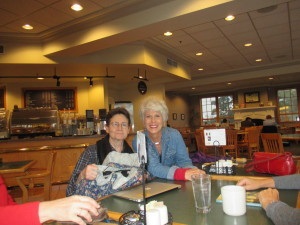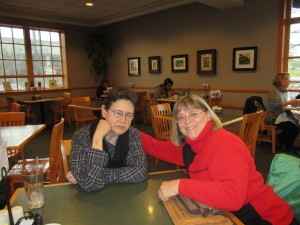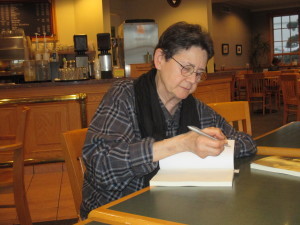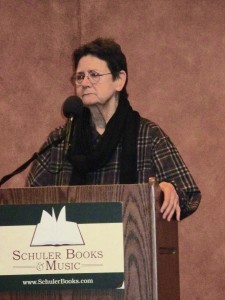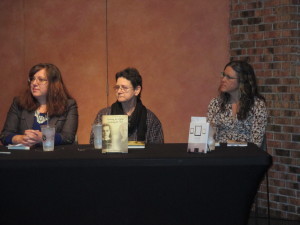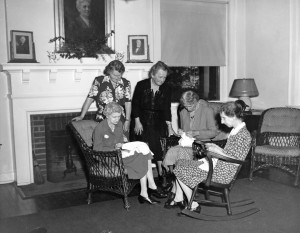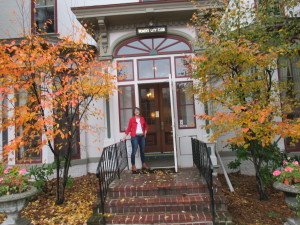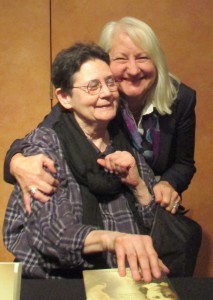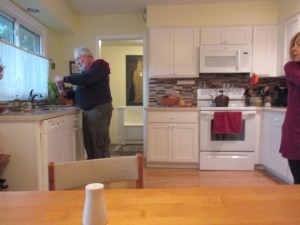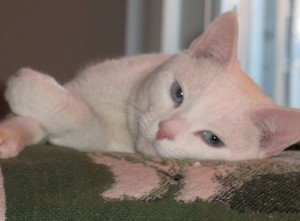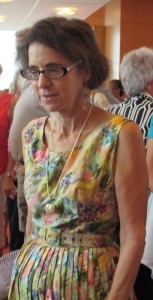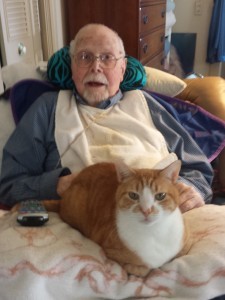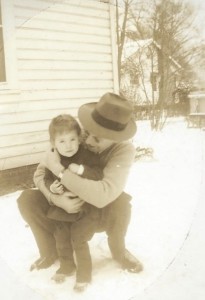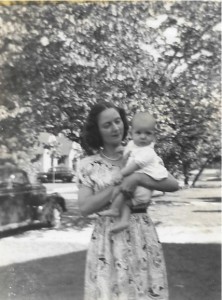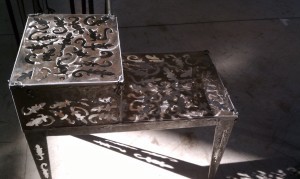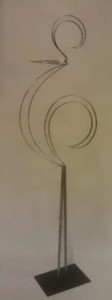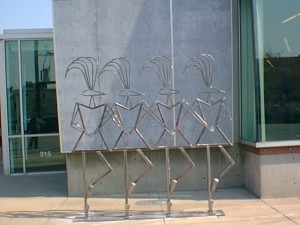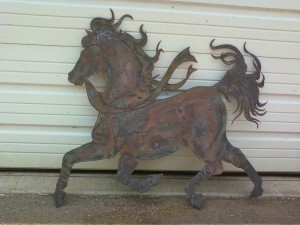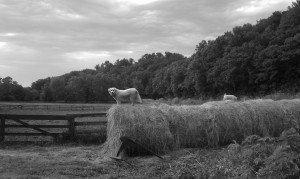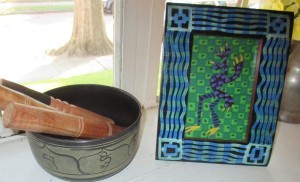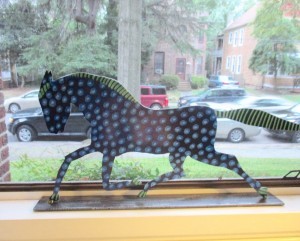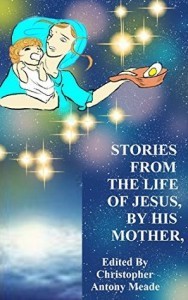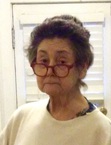Dean Robertson's Blog, page 13
November 7, 2015
Women, Compromise, and Life: A Friend Answers a Question
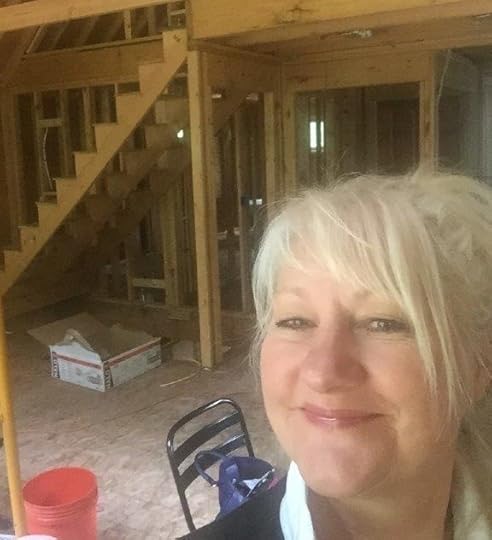
“I have been thinking about your question regarding my Michael and want to respond but I hope you won’t read it until sometime in the next weeks when you are sitting around doing nothing.”
“And I know now what my questions for Lydia will be, should I find her: What did you want? What did you get? What did you lose? We don’t know when Lydia met John Roper, but she saw something in this veteran of the California gold mines and the battlefields of Virginia, headed south with dreams of fortune, that allowed her to walk away from that Philadelphia life and go with him. What was Lydia Hand Bowen after? What dreams was she chasing?” (Looking for Lydia; Looking for God, 56).
When Teri came by, on the day I arrived in Grand Rapids, we spent several hours catching up, and–as has been true for the two of us since the day we met–we wasted little time with small talk, even after nearly fifteen years. She told me about her children and her grandchildren–her family–always the great loves of her life.
And she told me about her Michael. They have been together for eight years, and I am aware of how many of her dreams of the ideal relationship she has set aside.
And so I asked: “What is it about this relationship that it has lasted for eight years? Tell me about this man.”
I am sure I asked those questions as much for myself as for Teri, and as much for all of us as for Teri and me. I, too, wonder what I wanted and what I got and about the nature of the compromises I made to have this life I now live.
“And so, the ladies at the Roper Home and I are looking for God and Lydia and possibly ourselves. We have sometimes been frustrated, sometimes afraid; we have found good work, we have found each other. We are discovering God in some new ways” (Looking for Lydia, 164).
And Teri’s first answer was:
“I’d like to think about that.”
I have enjoyed pounding nails next to him as he builds his cabin. It is beautiful and very well done, and he is a smart worker and planner, very much like my father was. He will buy just the right amount of lumber for the weekend depending on what work he plans to do. He has paid for every board as he goes and so will own it when he is done.
He is all about pleasing me.
He massages me, especially my hands.
I am sixty years old and have been a court reporter since 1976; that’s thirty-nine years. These are hard-working hands.
No one has ever wanted to do that for me.
We love spending time together.
It is precious, like a vacation every time.
We laugh.
He takes me to fancy restaurants on New Year’s Eve and takes me to German restaurants whenever we are near one.
He loves to dance and will dance in the aisle of anywhere with me whether anyone else is dancing or not.
He sends me roses! He buys me sexy shirts for Christmas.
He once sold fine men’s suits, and he is always well dressed.
We do a lot of naked dancing, actually, at the cabin, when we are alone.
He loves and cares for his ninety-eight-year-old mother and is a star at the nursing home, where all the ladies wait for him to say hello and goodbye to them, which he does, of course, calling each one by name.
His boys were nervous about me, but I assured them I am not a threat and I understand that this is their cabin. He enables both boys ridiculously, which, thank God, is none of my business. The twenty-eight-year-old, his girlfriend, and her baby have just moved out; the thirty-year-old is still there.
Michael’s ex-wife has been living there since August until she moves into her new home on November 1st. I told him to keep his pants on and his door locked, and he assured me she’s not a threat. My one boundary is that we are sexually with only each other, and about that we have remained steadfast.
He does occasionally buy rounds of tequila for a table of girls. He is always the life of the party–a drinker and outgoing, like me. I can’t judge him.
He is great at sales and is Number One in his company.
He always pays for everything, and I like the powerfulness of his doing that. I enjoy being provided for, although if my children are coming to the cabin I buy the groceries for the weekend.
We are going to Cabo San Lucas on his company trip in February and to Costa Rica in March, where he hopes to find an apartment to rent for three months out of the year. We will see. I am not sure how long I can be away, although now that I am going back to free-lancing, no longer committed to a full-time job, I imagine that may be part of the plan.
We talk about sex a lot and have sex at least twice every weekend we are together.
He is very much a liberal Democrat, and his folks were union workers. He loves to talk about history and politics and is very very knowledgable about both. We disagree so vehemently about abortion that we can’t even talk about it.
He always wants to know what he can do to please me and begs me to tell him how. So I am not sure how functional or dysfunctional we are. He is always amazed to hear me say he is my best ever, as I don’t think he believes he gives as much as he should. He often says, “You need to find someone who will marry you.”
But somewhere along the way I finally gave up my Cinderella views and am much more willing to take each moment as it comes. I am grateful for the time we get to spend together and am finding it wonderful to let my Good come to me rather than having expectations or trying to manipulate someone into a relationship. It’s not always been easy, but my faith in my True Provider just gets stronger and stronger, and I know more and more that the blessings will come to me in God’s good time (and NOT sooner!).
I cannot believe the life I get to live and constantly feel like I am getting away with something.
I am especially good if I get to three meetings a week and my chiropractor and naturopath every few months. I have to work everyday on letting go of my alcoholic sons and my codependent daughter and not living in fear for my grandchildren.
None of us knows the day or the hour.
I realized with my dad passing that one day we all just go away and that I need to be in each moment as fully as possible. I have felt more relief than grief at that death and realize that all my life I have been waiting for the next critique or judgment of my life.
I am only sixty and I am growing up and into my full self!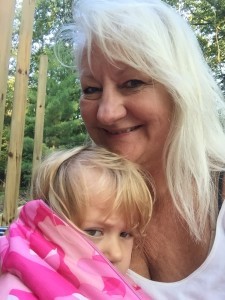
As you approach the end of this year and take a look back, order a copy of Looking for Lydia; Looking for God from Amazon or Barnes&Noble online, and join those women in their nineties as they unexpectedly discover themselves and each other by asking just these hard questions.
November 3, 2015
Maureen O’Hara: One Fiery Redhead
 Classic Movie Review by Ellen Bunton
Classic Movie Review by Ellen Bunton(and her eager assistant, Meatball)
A Regular Monthly Feature
The first Wednesday of the month.
Once again, we made it: November 4 2015
One Fiery Redhead
Maureen O’Hara was hard to categorize.
First of all, she was a true redhead; she didn’t need any help from the makeup department there.
She was undeniably beautiful yet somehow didn’t fall into the sex symbol category with another beauty, Hedy Lamarr.
She could act. She finally received the Academy HonoraryAward on Nov. 8, 2014, at the Governor’s Award Ceremony in Los Angeles. The great actor Charles Laughton saw her in an audition in London and recommended her for the film Jamaica Inn.
She also played Esmeralda opposite Laughton’s Quasimodo in The Hunchback of NotreDame in 1939 yet she was never given the kinds of roles played by Bette Davis or Joan Crawford.
She will probably be best remembered as the woman who was “man enough” to stand up to John Wayne.
She made five films opposite Wayne including the classic How Green was my Valley (1941), about a Welsh mining family, and The Quiet Man (1942), set in Ireland, about a former boxer.
I recommend both films, as well as my favorite, McLintock (1963), based loosely on The Taming of the Shrew.
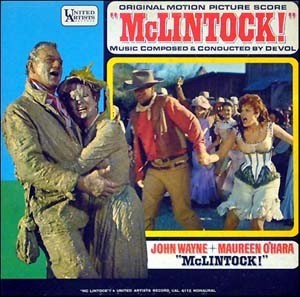 It is a western-comedy that has all those scruffy character actors whose faces are familiar but whose names you can never quite remember. John Wayne’s son, Patrick, plays in it, and a young Yvonne DeCarlo, who had a long movie career before becoming Lily Munster on TV.
It is a western-comedy that has all those scruffy character actors whose faces are familiar but whose names you can never quite remember. John Wayne’s son, Patrick, plays in it, and a young Yvonne DeCarlo, who had a long movie career before becoming Lily Munster on TV.
Maureen proved a real trooper in McLintock when movie husband John Wayne chased her all through town during a town fair.
She spent most of the scene in only her camisole and bloomers!
Maureen O’Hara died in her sleep on October 24, 2015, at the age of 95.
Thanks to the magic of film this fiesty redhead will live on.
With Christmas shopping just around the corner, consider the purchase of another work about feisty ninety-year-olds, Looking for Lydia; Looking for God–available from Amazon or Barnes and Noble online on this website in hard cover, paperback, or ebook.
An Interview for Lydia: Grand Rapids Morning Show

On September 5 I published a post about my interview with Bob Batcher on WHRO TV’s show, “Norfolk Perspectives.”
http://pdrobertson.com/2015/09/05/an-interview-for-lydia-norfolk-perspectives/
Yesterday, I published the second of my “Notes from the Road” blogs, “Second Stop: Grand Rapids, Michigan.”
http://pdrobertson.com/2015/10/31/notes-from-the-road-second-stop-grand-rapids-michigan/
In that second blog post, I described an interview on Grand Rapids’ WGVU Radio’s “Morning Show,” with Shelley Irwin.
I have heard so many horror stories about bad interviewers; about important interviews, broadcast live, gone terribly wrong; about lack of preparation for taping; about hours of waiting in uncomfortable chairs in sweltering hot or freezing cold studios; of professional incompetence and personal rudeness, that I approached the Norfolk interview with some anxiety and a full dose of skepticism.
Even after Bob Batcher proved all my projected disasters unfounded, I still walked into Ms. Irwin’s studio without high expectations.
I was wrong–again.
Click on the link below to find out just how wrong:
http://wgvunews.org/post/looking-lydia
Thank you, Shelley Irwin!
After you listen to me talk about Looking for Lydia; Looking for God, please go to the Home Page of this website and order from either Amazon or Barnes and Noble. Christmas is coming.
October 31, 2015
Notes from the Road: Second Stop, Grand Rapids Book Signing

Monday 26 October 20 2015
Artwork by Katherine Marty
Tomorrow I will fly into Grand Rapids, Michigan, arriving at 1:05 (with the usual creek-rising caveat), met by my dear friend, Wendy, who was just in Norfolk last month to attend the book talk at the Slover Library for Looking for Lydia; Looking for God. Wendy is the photographer for most of the images on the two blog posts about the Slover event:
In the second post, a photograph by someone other than Wendy managed to catch her in conversation with my cousin, Jane, who was there from Texas, and in company with the whole family, certainly as close to family as anyone who isn’t can be.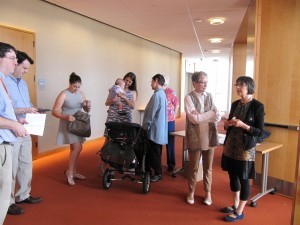
http://pdrobertson.com/2015/09/13/the-slover-book-talk-1-photographs/
http://pdrobertson.com/2015/09/25/the-slover-book-talk-2-more-photos-alas-the-video/
It has been several years, much too long, since my last trip to stay with Wendy and her husband, Eddie, in their beautiful condo in downtown Grand Rapids. The view from their balcony is one I remember fondly, although when I was there, the snow was not yet on the ground.
I lived in Michigan for ten years and I find myself missing the weather, a worthy opponent to be approached in ways unknown in Tidewater Virginia. I loved wading out in three feet of snow to break the ice in the water bucket for my llamas. I loved the sight of it and the sound it made when booted feet tromped across its frozen surface. I most loved the silence of it.
In my childhood in the deep woods of North Georgia, I can recall staying awake all night listening to great trees snapping and falling under the weight of ice and snow.
I planned this year’s trip to Michigan to arrive safely ahead of the weather.
Wendy, who is a miraculous combination of philosopher, teacher, networker, and planner (to say nothing of Bruce Springsteen fan and Pajama Partier),
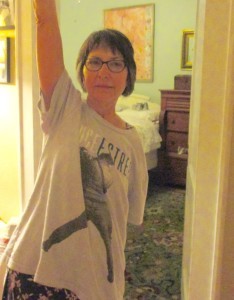 has scheduled me for a series of book talks of such number and variety I can hardly imagine I won’t forget which is which. On the Wednesday, they are so relentlessly close together as to guarantee my complete collapse on Thursday, just in time for a long luncheon at Wendy’s Club at a table carefully orchestrated to include only potential consumers of presentations and collaborations related to the book.
has scheduled me for a series of book talks of such number and variety I can hardly imagine I won’t forget which is which. On the Wednesday, they are so relentlessly close together as to guarantee my complete collapse on Thursday, just in time for a long luncheon at Wendy’s Club at a table carefully orchestrated to include only potential consumers of presentations and collaborations related to the book.
I believe people are paid vast sums of money to do precisely what Wendy has done in Grand Rapids.
Tuesday
2:30 Telephone conference/editing for a friend’s graduate school application
Fresh from the airport, I finished the editing in half the time we’d anticipated since we really had already done the job and just needed to attend to final details. Then an unexpected visit from an old friend who was a part of the small group of women who built and shared a sweat lodge on my property for many years.
Wednesday
Event #1 The Interview: Prologue
I am up at my usual 5:00 am, showered and dressed. Of all the shirts I packed, I have chosen the flannel for comfort. I opened my eyes with an awful cold, something I almost never get, and the weather report says rainy and high 40’s.
I’m on my second cup of amazingly good coffee, poured from a pot set up last night and ready to be turned on when I walked into the kitchen. This condo is a place where I am immediately at home no matter how many years between visits. These are remarkably good people, collectors of interesting art, active in the community, social, political in the best sense, and with all that engagement with the world somehow creating around them a safe place for a friend to land.
I am wondering what on earth I can say to Shelley Irwin in a ten-minute interview. “Buy this book??” 
9:20 Interview with Shelley Irwin for her Morning Show on Grand Rapids’ WGVU
Shelley Irwin, with whom I have exchanged many emails over the last several months, turns out to be a lovely person–bright, articulate, efficient, and a very fine interviewer. There was no warm-up chat and the show was live. I was one of several guests; everything ran on schedule. I think there was less than a two minute space between my sitting down at the microphone and the interview beginning. Shelley had clearly read enough of the book to know what questions to ask. She listened to my responses and shaped her follow-up questions to fit.
As I do whenever I speak, I have forgotten most of what I said. I think it went well. It was, in any case, a pleasant experience. I will eventually have a link to the interview.
Event #2 Beacon Hill: Prologue
Sitting quietly at Wendy and Eddie’s dining room table which, like my own, is nearly covered with issues of The New Yorker and last Sunday’s New York Times, I realize that in all the emails I have exchanged with Rich Verkaik, Beacon Hill’s chaplain, I still don’t know how much time he has planned for my presentation, how many people he anticipates, or what preferences he might have for the focus of my talk. It’s a good thing he suggested lunch.
I have nearly an hour before we have to leave and this time is valuable. Wendy shares the table with me as I type and she reads The New Yorker. I imagine that she and Eddie spend their Sunday mornings with the Times. The details of a life are important.
12:30 Lunch with the chaplain at Beacon Hill Retirement Community
Lunch with Rich Verkaik was a surprise. Even having walked through the elaborately decorated lobby with what seems miles of small conversation areas of plush sofas and well-stuffed armchairs, the gourmet menu, table linens, and good flatware caught me off guard, as did the young woman who came to our table to take our orders.
I asked if the residents had the same menu and, of course, they don’t. This luncheon set-up, with large printed menus reminiscent of any fine dining establishment, is designed to impress guests. Spending your final years at Beacon Hill doesn’t come cheap, and I imagine that a gourmet meal is the least of the enticements offered to potential residents and their families.
Rich, on the other hand, was just what I had expected. In person, he is the same straightforward and comfortable man with whom I have corresponded for several months. Conversation was easy. I asked about the cost of an apartment at Beacon Hill, about the age of the facility, and about the upcoming expansion announced on their website.
I asked Rich how long he had been there.
“And do you like it?”
“Yes and No. It can wear you out, and I find I’m thinking more often now about retirement.”
I know that Rich’s mother died two weeks ago and then his mother-in-law, to whom he was close, four days later. At the end of the lunch I bring that up and we talk briefly about the death of mothers, how huge an event it always is. We were both with our mothers when they died.
He and Wendy talked about people and things in Grand Rapids. He asked how we met.
2:00, Talk and question-and-answer at Beacon Hill.
A small group grew to 25.
Wendy, who counted the audience, thinks people came who were interested in the topic, intrigued by the book’s title, and the question period went well. Residents were eager to talk about the writing they were doing or planning.
Again, I have no clear sense of how the talk went. Rich says he was happy with it. Wendy says fine; maybe I should have read more from the book, then asked questions based on each reading rather than just general questions. It’s a good idea. If I don’t have a recording I don’t remember what I said so, with the exception of the television interview in Norfolk (which is on YouTube), I don’t really know what I’m doing right or wrong. I count on friends like Wendy to listen and critique. In Kentucky, I will incorporate suggestions like this one.
I am learning.
Events 3 and 4: Dinner and Book Signing: Prologue and Event
5:00 Dinner with friends at Schuler Books’ cafe
7:00 Talk and book signing at Schuler Books and Music: Two young women on the program with me had written intriguing books.. We each spoke and answered questions; people bought books; we signed them. Looking for Lydia sold out!!
Thursday
10.45 Arrival for program, lunch, and schmoozing, at The Women’s City Club
Friday
10:50 G uest lecture in a Non-Fiction Writing class at Aquinas College, then home for an afternoon and evening with old friends, Pamela and William.
Wendy and I got to Aquinas a little early, both of us preferring the extra time to be sure of parking, to be certain about the classroom and building.
I was delighted that the class was slotted for the 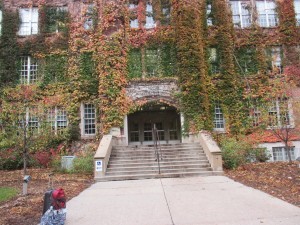
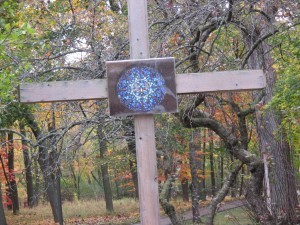 Academic Building which was my old stomping grounds during my years at Aquinas. I don’t know the building’s history but, given my recent obsession with the years following the Civil War, I expect I’ll find out.
Academic Building which was my old stomping grounds during my years at Aquinas. I don’t know the building’s history but, given my recent obsession with the years following the Civil War, I expect I’ll find out.
And the week ended with an overnight with friends, Pamela and William, in their newly renovated home. And, once again-one last time-dear, dear Teri showed up for a couple of hours.
Saturday
6:55 am Heading home with a four and a half layover in Detroit. Not like the non-stop flights to Dallas/Ft. Worth. Every journey is different; every journey is an adventure. I’m afraid I am, at heart, an armchair traveler.
The end of a good week of marketing the book; Wendy has outdone herself and put out feelers to every organization she can think of. There was a short, intense time with Pamela and William. There was the friend, our age, who developed an infection after a routine surgery and is in a nursing home. When I walked in, she called out, “Dean Robertson!” And when I bent over to kiss her forehead, she said in her quiet voice, “I will be here for the rest of my life.”
Tonight I will sleep in my own bed with Isaac.
When you start thinking ahead to Christmas, there is no better book to give friends and family than Looking for Lydia; Looking for God, the story of salvation and resurrection in an unexpected place at an unexpected age. The first thing to do is read it yourself!!
The post Notes from the Road: Second Stop, Grand Rapids Book Signing appeared first on Dean Robertson.
Notes from the Road: Second Stop, Grand Rapids, Michigan

Monday 26 October 20 2015
Artwork by Katherine Marty
Tomorrow I will fly into Grand Rapids, Michigan, arriving at 1:05 (with the usual creek-rising caveat), met by my dear friend, Wendy, who was just in Norfolk last month to attend the book talk at the Slover Library for Looking for Lydia; Looking for God. Wendy is the photographer for most of the images on the two blog posts about the Slover event:
http://pdrobertson.com/2015/09/13/the...
http://pdrobertson.com/2015/09/25/the...
In the second post, a photograph by someone other than Wendy managed to catch her in conversation with my cousin, Jane, who was there from Texas, and in company with the whole family, certainly as close to family as anyone who isn’t can be.
It has been several years, much too long, since my last trip to stay with Wendy and her husband, Eddie, in their beautiful condo in downtown Grand Rapids. The view from their balcony is one I remember fondly, although when I was there, the snow was not yet on the ground.
I lived in Michigan for ten years and I find myself missing the weather, a worthy opponent to be approached in ways unknown in Tidewater Virginia. I loved wading out in three feet of snow to break the ice in the water bucket for my llamas. I loved the sight of it and the sound it made when booted feet tromped across its frozen surface. I most loved the silence of it.
In my childhood in the deep woods of North Georgia, I can recall staying awake all night listening to great trees snapping and falling under the weight of ice and snow.
I planned this year’s trip to Michigan to arrive safely ahead of the weather.
Wendy, who is a miraculous combination of philosopher, teacher, networker, and planner (to say nothing of Bruce Springsteen fan and Pajama Partier),
 has scheduled me for a series of book talks of such number and variety I can hardly imagine I won’t forget which is which. On the Wednesday, they are so relentlessly close together as to guarantee my complete collapse on Thursday, just in time for a long luncheon at Wendy’s Club at a table carefully orchestrated to include only potential consumers of presentations and collaborations related to the book.
has scheduled me for a series of book talks of such number and variety I can hardly imagine I won’t forget which is which. On the Wednesday, they are so relentlessly close together as to guarantee my complete collapse on Thursday, just in time for a long luncheon at Wendy’s Club at a table carefully orchestrated to include only potential consumers of presentations and collaborations related to the book.
I believe people are paid vast sums of money to do precisely what Wendy has done in Grand Rapids.
Tuesday
2:30 Telephone conference/editing for a friend’s graduate school application
Fresh from the airport, I finished the editing in half the time we’d anticipated since we really had already done the job and just needed to attend to final details. Then an unexpected visit from an old friend who was a part of the small group of women who built and shared a sweat lodge on my property for many years.
Wednesday
Event #1 The Interview: Prologue
I am up at my usual 5:00 am, showered and dressed. Of all the shirts I packed, I have chosen the flannel for comfort. I opened my eyes with an awful cold, something I almost never get, and the weather report says rainy and high 40’s.
I’m on my second cup of amazingly good coffee, poured from a pot set up last night and ready to be turned on when I walked into the kitchen. This condo is a place where I am immediately at home no matter how many years between visits. These are remarkably good people, collectors of interesting art, active in the community, social, political in the best sense, and with all that engagement with the world somehow creating around them a safe place for a friend to land.
I am wondering what on earth I can say to Shelley Irwin in a ten-minute interview. “Buy this book??” 
9:20 Interview with Shelley Irwin for her Morning Show on Grand Rapids’ WGVU
Shelley Irwin, with whom I have exchanged many emails over the last several months, turns out to be a lovely person–bright, articulate, efficient, and a very fine interviewer. There was no warm-up chat and the show was live. I was one of several guests; everything ran on schedule. I think there was less than a two minute space between my sitting down at the microphone and the interview beginning. Shelley had clearly read enough of the book to know what questions to ask. She listened to my responses and shaped her follow-up questions to fit.
As I do whenever I speak, I have forgotten most of what I said. I think it went well. It was, in any case, a pleasant experience. I will eventually have a link to the interview.
Event #2 Beacon Hill: Prologue
Sitting quietly at Wendy and Eddie’s dining room table which, like my own, is nearly covered with issues of The New Yorker and last Sunday’s New York Times, I realize that in all the emails I have exchanged with Rich Verkaik, Beacon Hill’s chaplain, I still don’t know how much time he has planned for my presentation, how many people he anticipates, or what preferences he might have for the focus of my talk. It’s a good thing he suggested lunch.
I have nearly an hour before we have to leave and this time is valuable. Wendy shares the table with me as I type and she reads The New Yorker. I imagine that she and Eddie spend their Sunday mornings with the Times. The details of a life are important.
12:30 Lunch with the chaplain at Beacon Hill Retirement Community
Lunch with Rich Verkaik was a surprise. Even having walked through the elaborately decorated lobby with what seems miles of small conversation areas of plush sofas and well-stuffed armchairs, the gourmet menu, table linens, and good flatware caught me off guard, as did the young woman who came to our table to take our orders.
I asked if the residents had the same menu and, of course, they don’t. This luncheon set-up, with large printed menus reminiscent of any fine dining establishment, is designed to impress guests. Spending your final years at Beacon Hill doesn’t come cheap, and I imagine that a gourmet meal is the least of the enticements offered to potential residents and their families.
Rich, on the other hand, was just what I had expected. In person, he is the same straightforward and comfortable man with whom I have corresponded for several months. Conversation was easy. I asked about the cost of an apartment at Beacon Hill, about the age of the facility, and about the upcoming expansion announced on their website.
I asked Rich how long he had been there.
“And do you like it?”
“Yes and No. It can wear you out, and I find I’m thinking more often now about retirement.”
I know that Rich’s mother died two weeks ago and then his mother-in-law, to whom he was close, four days later. At the end of the lunch I bring that up and we talk briefly about the death of mothers, how huge an event it always is. We were both with our mothers when they died.
He and Wendy talked about people and things in Grand Rapids. He asked how we met.
2:00, Talk and question-and-answer at Beacon Hill.
A small group grew to 25.
Wendy, who counted the audience, thinks people came who were interested in the topic, intrigued by the book’s title, and the question period went well. Residents were eager to talk about the writing they were doing or planning.
Again, I have no clear sense of how the talk went. Rich says he was happy with it. Wendy says fine; maybe I should have read more from the book, then asked questions based on each reading rather than just general questions. It’s a good idea. If I don’t have a recording I don’t remember what I said so, with the exception of the television interview in Norfolk (which is on YouTube), I don’t really know what I’m doing right or wrong. I count on friends like Wendy to listen and critique. In Kentucky, I will incorporate suggestions like this one.
I am learning.
Events 3 and 4: Dinner and Book Signing: Prologue and Event
5:00 Dinner with friends at Schuler Books’ cafe
7:00 Talk and book signing at Schuler Books and Music: Two young women on the program with me had written intriguing books.. We each spoke and answered questions; people bought books; we signed them. Looking for Lydia sold out!!
Thursday
10.45 Arrival for program, lunch, and schmoozing, at The Women’s City Club
Friday
10:50 G uest lecture in a Non-Fiction Writing class at Aquinas College, then home for an afternoon and evening with old friends, Pamela and William.
Wendy and I got to Aquinas a little early, both of us preferring the extra time to be sure of parking, to be certain about the classroom and building.
I was delighted that the class was slotted for the 
 Academic Building which was my old stomping grounds during my years at Aquinas. I don’t know the building’s history but, given my recent obsession with the years following the Civil War.
Academic Building which was my old stomping grounds during my years at Aquinas. I don’t know the building’s history but, given my recent obsession with the years following the Civil War.
And the week ended with an overnight with friends, Pamela and William, in their newly renovated home. And, once again-one last time-dear, dear Teri showed up for a couple of hours.
Saturday
6:55 am Heading home with a four and a half layover in Detroit. Not like the non-stop flights to Dallas/Ft. Worth. Every journey is different; every journey is an adventure. I’m afraid I am, at heart, an armchair traveler.
The end of a good week of marketing the book; Wendy has outdone herself and put out feelers to every organization she can think of. There was a short, intense time with Pamela and William. There was the friend, our age, who developed an infection after a routine surgery and is in a nursing home. When I walked in, she called out, “Dean Robertson!” And when I bent over to kiss her forehead, she said in her quiet voice, “I will be here for the rest of my life.”
Tonight I will sleep in my own bed with Isaac.
When you start thinking ahead to Christmas, there is no better book to give friends and family than Looking for Lydia; Looking for God, the story of salvation and resurrection in an unexpected place at an unexpected age. The first thing to do is read it yourself!!
October 24, 2015
There’s something in the way he smiles. . .

A Smile a Minute: Joel Osteen
Posted onJanuary 6, 2015 AuthorDean Robertson
Just as the year turned, my friend and student from nearly thirty years ago, Thomas Clay Jr., invited me to write short pieces for his blog on Facebook, American News X. I was in the process of submitting the manuscript of Looking for Lydia; Looking for God to agents and small publishers and trying to figure out the intricacies of the Internet.
I was also trying to figure out, for Thomas, the intricacies of writing “click bait” pieces for a satirical political site. I never quite mastered them.
It was in the few posts I wrote for him, however, that I learned the skill and a taste for writing short essays on deadline. It was in those posts, offered as something for an old teacher to do while she waited for some nibbles on her book, that this weekly blog really began.
The year at The National Enquirer ends with a predictable, barely audible, bang: popular televangelist rakes in money; profits roll in to a non-profit church; attorneys smell blood in the water.
Impressions: A line-up in my mind: One, the pastor of the largest mega-church in America; one a former deputy-director of the National Security Council; one, Secretary of State for two administrations. I remember pictures I have avoided for decades: the wolfish grins that don’t quite reach the eyes; the dead eyes. I recall having trouble staying in the room when Oliver North was on television. I recently saw a documentary about Donald Rumsfeld and could hardly keep myself from leaving the theater. The smile frightens me more than any gesture of overt aggression; it holds me in place; it mesmerizes.
The details hardly seem to matter.
Joel Osteen is making millions at his mega-church in Houston, Texas. His sermons, preached to crowds numbering in the five figures, are televised in 100 countries. The church is housed, after a 2003 purchase and multi-million dollar renovation, in the Compaq Center, former home of the NBA Houston Rockets. When the church moved into the Center, the New York Times covered the occasion.
Christianity in a sports arena is not a new phenomenon. This church has, instead of a cross or any other symbols of the religion that Osteen loosely espouses, “a cafe with wireless Internet access, 32 video game kiosks and a vault to store the offering.” This last reminds me of a scene in a 1972 documentary, “Marjoe,” in which a young tent revivalist sits on a bed in his motel room after a revival, counting piles of cash, smiling and chanting, “Praise the Lord, and thank you, Jesus.” Joel Osteen doesn’t have to count his own cash in a cheap motel room. Joel Osteen has a staff to do his counting and to store the cash in the vault at the Compaq Center. Why does Osteen, all too common a type in American culture, part of the landscape since the tent revival movement after the Civil War, seem so particularly egregious? Why does Jim Bakker, by comparison, seem quaint, almost harmless, hearing God speak to him in his bathtub?
I don’t pay much attention to Joel Osteen except to have seen and heard him enough to know I don’t like seeing or hearing him. He is a manifestation of the all-too-common and all-too-successful televangelist of a mega-church somewhere in the western United States. Like some of his predecessors, he rides in a limo, lives in a mansion, has a blonde wife who is his co-pastor, publishes New York Times best-sellers shelved under “inspirational,” “motivational,” or “self-help” at the bookstore. A glance at the titles, or at the titles of the hundreds of articles that have been written about him, tells me that Joel Osteen’s message is about Joel Osteen. Joel Osteen is a superstar, a salesman of the Positive.
Nothing new at all. A so-called Christian preacher, net worth in the millions, preaching the gospel, not of Jesus (whom he seldom mentions) but the gospel of worldly success, of well-being and, above all else, the gospel of feeling good (because we deserve it).
In a feature article in December of 2007, People magazine reported that Osteen had been paid a reported $13 million for one book.
The same article quotes Osteen as saying, “I don’t want to sound naive, but I was never in it for the money.”
My impressions remain the same: a preacher; an intelligence agent; a Secretary of Defense. That smile and those eyes, make my skin crawl.
Thomas Clay Jr. and his American News X site can be found at:
Looking for Lydia; Looking for God is not a 500 word piece of political satire.
Nonetheless, it’s a provocative read. You can buy it in hardback, paper, and ebook, on Amazon and Barnes and Noble online.
It’s time to start thinking about Christmas presents.
October 17, 2015
Journey Out of Grief: Guest Blogger Alison Daniels with Dean Robertson
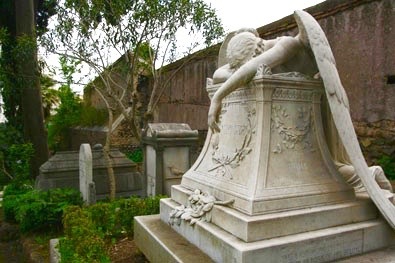
I met Alison when she and her friend, Valorey, joined a book club to which I belonged. She came in a little late, wearing a 1950’s sundress–obviously a carefully selected thrift-store purchase–a huge hat, and a shawl. Her very eccentricity got my attention, and I always think of Alison as draped rather than just dressed. I found out recently that, for twenty years, she has had a life in Manhattan in which she walks, daily, into the front door of the high-tech office building where she works, dressed in pinstripes and heels.
I am getting to know her.
When I asked her to write for this blog, Alison responded, “Well, I have something I’ve been working on for a long time; it’s about grief.”
Turns out, as these things tend to do, that it is a profound time for me to think about loss and grief.
Meet my good friend, Alison Daniels
Alison Nearly two years ago now, I received the phone call that would shatter the future I had envisioned for myself. A dedicated loner, I had finally, in my fifth decade, met someone who seemed to be that elusive “soulmate” with whom I could actually imagine spending my life.
Gary lived in another state, and I was in the process of moving there to be with him. One day I wasn’t able to reach him by phone. Since we had first known each other, we always talked every day, and typically first thing in the morning. That was the ritual. It was ridiculous, how much time we spent talking on the phone.
I miss those early morning calls every day.
When I didn’t get my usual morning call, I rang him, but got no answer. Maybe he is just still asleep, I thought. Then I rang him again an hour or so later. There was still no answer. I tried again later in the day. No answer. I knew something was very wrong, yet I didn’t want to know. I called a mutual friend who lived within an hour of the home that Gary and I had bought together, and asked him to check on him. I didn’t betray how worried I was. Maybe he was just tired. Maybe a friend had visited. Maybe he just didn’t want to talk to me. More hours went by. I tried to have a normal day, telling myself everything would be all right.
That evening, I got the phone call. Nothing would ever be all right again. Our friend gently advised me to sit down, and broke the news. “He’s gone, honey.”
I called my mother first, of course. We always look first to our mothers for comfort, if we still have our mothers with us. I didn’t sleep all night. The world seemed surreal and I went into auto-pilot. The next day I flew down south.
We had adopted a shelter dog, Radar, we loved dearly. Gary had chosen him, probably liking the fact that he was named for the character in MASH. Radar had made him laugh despite his chronic pain. One of my best friends arrived to take him home with her. The deal was that one day I would take him back, that I would live in the home my fiancé and I were supposed to share.
Could I really do that? All my belongings had been packed for me to make my move. Now I felt frozen in time. I didn’t sleep for three days. I didn’t need sleep. There were arrangements to be made, and then I went back home. I had to tell friends what had happened. I cried, they cried. Everyone knows how you feel, and yet they don’t.
I went on with my life, my routine. Yet I cried all the time. I never seemed to run out of tears. Earlier that same year, a beloved pet had died. I still cried for her too. Tears are cathartic, but you wonder when you will stop grieving quite so much. You wonder when grief stops defining you.
I kept looking for answers, obsessively trying to determine the exact cause of Gary’s death. Since we hadn’t married, I was not the next of kin. I had no rights to information. I knew some things about the state of my Gary’s health and that it wasn’t great, but realized there was much he had hidden from me: his untreated alcoholism, and the years of neglecting his health. I felt tremendous guilt. I should have been with him when he died. I should have spent more time with him. I should have done more. I should have saved him. I should have cured him. I shouldn’t have lost my temper with him. I remember his last words to me, nothing of consequence: “I’ll call you later.” My last words to him? I think I said “I love you.” I hope I did. I hope he knew.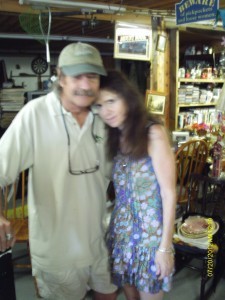
I kept flying back and forth every month. One evening when I was at the house I stood outside, under the stars. I heard a deep male voice saying my name just once. To this day I remain convinced it was Gary’s voice – the deep voice that had attracted me to him when I first heard it over the phone. I always said he sounded like Gregory Peck. Months later as I continued to return to the house, checking on it, having maintenance work done, moving more of my belongings slowly from one home to another, I heard a mockingbird serenading me from the top of the chimney. I took that as a sign. Everything became a sign when I was in the mood to be sentimental. I guess we want to believe that there is still a presence of the loved one remaining on earth. I kept many of Gary’s clothes in the closet. I kept many things as they were, where they were, where he had placed them. I still have a bottle of his aftershave, and sometimes I open the bottle and breathe it in. There are photos. There are love letters. He existed.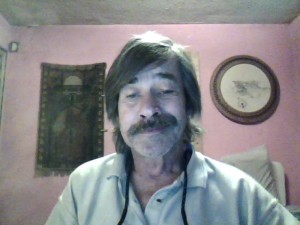
I had been given custody of his ashes and planned to scatter them on the beach, but for almost a year I couldn’t bear to think of even opening up the box that held what remained of the person I had loved. I waited. Finally, I scattered some of his ashes, and then placed the remainder in an urn for safekeeping. My grief feels self- indulgent. We had known each other only about two years. This was not a lifetime partner. My grief cannot compare to those who lose a husband of decades, who lose a child. It doesn’t compare to those who lose a loved one in the kind of senseless murderous rampages that assault us in the news all the time. But it is my grief and I carry it with me.
Grief marks you – things that used to seem important now pale in comparison. You feel you can handle anything as long as it is not a matter of life and death.
Gary had once spoken of his conviction that we would find each other in the after-life. I don’t know if I believe that, but now I am more at peace with dying, just in case he is indeed waiting. And he won’t be the only one. Some of my loved ones have gone before him. I hope we will all find each other. I like to think of my father and my fiancé meeting. That would have been an interesting encounter, the two most significant men in my love, the two men who had made me feel safe.
I knew I could survive it. There is no other choice. Time helps us heal but we do not forget. The bottom can drop out of our worlds, but we go on about the daily business of living. We even laugh again. Two years later, I am still recovering; I am a survivor.
I came to live in the house Gary and I were supposed to share. My mom lives here now, in her own guest house. My two cats came to the house kicking and screaming but acclimated after a week of hiding under the bed. Now it’s their house, too.
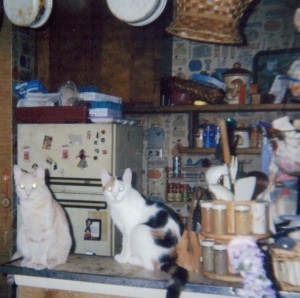 My friend drove up to return my dog; she cried saying goodbye to him because he’s easy to love. Radar is my connection to my other life. There are memories he and I share. He’s a great comfort, as all animals are to me. I feel stronger. I feel sad. I feel fortunate.
My friend drove up to return my dog; she cried saying goodbye to him because he’s easy to love. Radar is my connection to my other life. There are memories he and I share. He’s a great comfort, as all animals are to me. I feel stronger. I feel sad. I feel fortunate.
There’s a poem by William Wordsworth that captures the acceptance of grief:
What though the radiance
Which was once so bright
Be now for ever taken from my sight,
Though nothing can bring back the hour
Of splendour in the grass,
of glory in the flower,
We will grieve not, rather find
Strength in what remains behind.
We all experience grief; we all experience it differently. And somehow most of us make it through to the other side. And one day, others will grieve for us.
Dean It is Thursday night, the 24th of September 2015, and tomorrow morning I will board a plane headed for the Atlanta airport. From there, a friend will drive me to the small town where I grew up. I am going to Cedartown, Georgia, to see someone I love, almost certainly for the last time. He is ninety-five years old, and he is dying. He might or might not know who I am; in fact, he might or might not live until I get there. Tomorrow morning I will board a plane headed for the Atlanta airport.
Last Thanksgiving I made this same trip to sit with my four cousins while their mother, Olin’s wife, lay dying. She did not regain consciousness while I was there, and she died before I left.
In 1962 my father died of a sudden heart attack at the age of 52. I was sixteen and a senior in high school. A mentor, an Episcopal priest, took me to the funeral home to see Daddy. All I could say was,”He needs his glasses.” I have never “viewed” the body of another person. I will be cremated.
Twenty years ago my mother died in Montgomery, Alabama, and my son and I took her ashes to Cedartown and, with our bare hands, we dug them into the dirt on my father’s grave. There were bone chips in the ashes, and there was a fine dusting of ashes on our hands and arms. I put one finger into my mouth; the taste was bitter.
More times than I can count I have held animals–cats, llamas, baby rabbits, birds–in my lap at the end. I have loved every one–friend, family, or animal, as if I would somehow never love again. In Robert Bolt‘s play, A Man for all Seasons, Thomas More, hours away from his own death, reminds the assembled court that, “Death comes for us all, my lords; even for kings he comes. . .”
Joan Didion describes The Year of Magical Thinking, written after her husband’s death, as “my attempt to make sense of the period that followed, weeks and then months that cut loose any fixed idea I ever had about death, about illness, about probability and luck, about good fortune and bad. . . about the ways in which people do and do not deal with the fact that life ends, about the shallowness of sanity.” She writes, “Grief has no distance. Grief comes in waves, paroxysms, sudden apprehensions that weaken the knees and blind the eyes and obliterate the dailiness of life.”
Anne Lamott, in Travelling Mercies, bemoans the fact that “All those years I fell for the great palace lie that grief should be gotten over as quickly as possible and as privately. But what I’ve discovered since is that the lifelong fear of grief keeps us in a barren, isolated place and that only grieving can heal grief; the passage of time will lessen the acuteness, but time alone, without the direct experience of grief, will not heal it.”
And, finally, I shoulder reluctantly what many have called simply my share of the world’s pain.
“The vast universal suffering feel as thine;
Thou must bear the sorrow that thou claims to heal;
The day-bringer must walk in darkest night.
He who would save the world must share its pain.
If he knows not grief, how shall he find grief’s cure?” Sri Aurobindo
In the early evening of Monday the 5th of October 2015, Olin Jackson Bates “slipped out the back door,” as his youngest daughter told me when she called. I loved him as if I will somehow never love again.
October 13, 2015
The New Bates Webster Gallery: October 2015

“I made that in 2008, I think that’s right! It is watercolor. The girls got watercolor sets in their stockings for Christmas so we all sat in the kitchen painting for days. My critters in the painting remind me of all different types of people. I use critters because animals are generally pleasant to be around. “
Before I hand this space over to the artist, I will add a few of the many wonderful photographs of her life with which she has trusted me. You will find a scattering of these in all the Bates Webster Gallery posts to come:

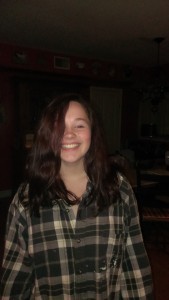
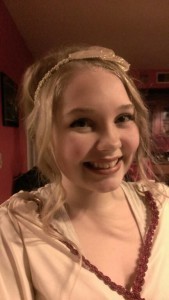

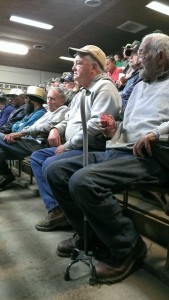
The New Bates Webster Gallery: October 13 2015
I have always been fascinated with light and shadows. When I was younger I remember playing tennis at night. I was scolded for paying more attention to the multiple shadows of my “arm swan” than to hitting the ball.
When I make a piece like this lizard table I am more impressed with the shadows than the actual piece. What I see in my work is often different than what others see and enjoy. The name is not important to me unless I begin a piece for a specific reason.
This is simply called Lizard Table.
This piece does have a name. “It’s All Chicken” was made for a dear friend and her son. There is a long story behind the name, and that is for the three of us to know. For me, the simple lines and curves represent how we want life be–a smooth road. We all know that life is filled with bumps and snags. This is made from carbon steel and is over five feet tall.
This is titled “Swan Lake”; it was a commissioned bicycle rack for the city of Louisville. The sculpture stands in front of the Louisville Ballet. If you are familiar with ballet, it is self- explanatory.
This Star Lamp is one of my favorites. It’s made from carbon steel and yellow rice paper. I wish that I had started making lamps like this when my children were younger.
I don’t always make realistic sculptures, but when I do I enjoy the challenge. This Horse was commissioned several years ago. The detail was painted on using a variety of patinas. I was excited to watch the patinas make the horse come to life.
Never underestimate the element of surprise.
Recently I have started incorporating color in my work, a variation on an old theme. This creature is made of carbon steel, 20” h x 22.5”w x 5”d. What is it? I don’t know that is up to you to determine. Price: $45.00
I am usually distracted by small things while doing routine chores on the farm. Any early morning, or in the evening on my way back to the house, I might see dogs playing on the hay bales, small bugs climbing, or dew drops.
 Everything I encounter daily is part of my work. In my world, the small things take me to a real and beautiful place.
Everything I encounter daily is part of my work. In my world, the small things take me to a real and beautiful place.
Welcome to the Bates Webster Gallery.
Come in; look around; enjoy; take home a piece of art.
Already at my house in Norfolk, Virginia: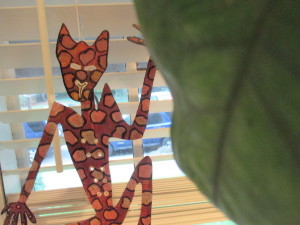
Bates can be contacted at:
drawwithfire.com
P.O.Box 162, Sulphur, KY 40070
502.210.3982
or
bateswebster@gmail.com
And while you’re shopping–for yourself or friends and family–consider a copy of Looking for Lydia; Looking for God, the story of a journey into beauty of a different kind.
October 10, 2015
My Guest: Christopher Antony Meade on Forgiveness
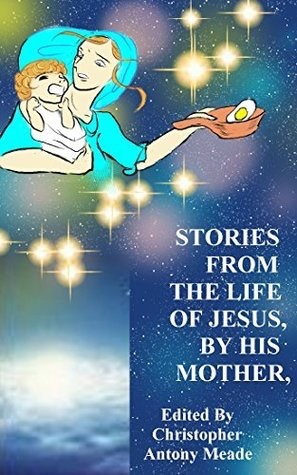
Christopher Antony Meade is one of those shady “friends” who seem to rise to the surface in one way or another on Facebook. In Christopher’s case, I believe I first saw his name, and the title of his novella, on an authors’ forum for the publisher we share. As I’ve said in other venues, The Zombie, The Cat, and Barack Obama was irresistible from the moment I spotted the cover. I bought it; I read it; I loved it; I reviewed it; I recommended it to everyone I know.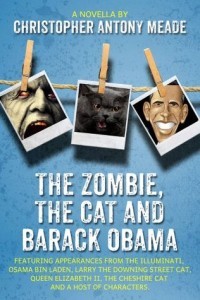
Then late last month, Christopher’s name appeared in my sights again, as the editor of a collection called Stories from the Life of Jesus. “Stories from the life of Jesus”? Edited by the author of The Zombie, The Cat, and Barack Obama? But I have read, researched, and taught the Judaeo-Christian Scriptures for over thirty years, and anything that looks relevant usually ends up on my Kindle for a trial run. And so it will go with this new book.
Some thoughts on repentance, redemption and forgiveness
by Christopher Antony Meade
How would you feel if you died tomorrow, went to Heaven and then found yourself living next door to Adolf Hitler?
Would you be shocked and appalled to discover that the person in the “mansion” upstairs from your own was Josef Stalin, Harold Shipman or Al Capone?
I’m Irish. I think it reasonable to expect that Oliver Cromwell, who murdered tens of thousands of my compatriots, should be roasting over an eternal slow fire, but he may not be. I might be going to endless heavenly cocktail parties with him, along with Attila the Hun and Saddam Hussein.
The reason I am asking this apparently mad question is because I want to ponder the notion of repentance and redemption, with a little bit of forgiveness thrown in as well.
If, like me, you have a pretty conventional belief in God as the arbiter of our destinies and as the fount of all forgiveness, can you actually rule out the possibility that His mercy might be extended to many more than we would immediately think.
Take the example of Josef Stalin. Stalin was in life a pretty loathsome character. He was directly responsible for the murder of many millions and the policies he pursued throughout his life led to misery and death for countless millions more.
But when he died in 1953, he was lying helplessly in his room for around fifteen hours and it took him another few days of agony to finally expire after he was found. What thoughts occupied the mind of “the Georgian monster” as he lay on the floor of his urine soaked bedroom?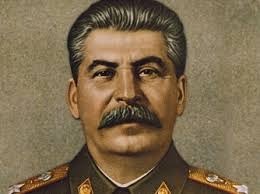
Was he just conscious of the pain and indignity of his situation?
Was he planning a dreadful revenge on his doctors and his colleagues if he recovered?
Is it possible, that in his last days, an awareness of the terrible things he had done might have seared itself into his brain? When those around his bedside saw him groaning in, what they thought, was agony, might he have been groaning in anguish instead? Anguish over a life misspent and a God horribly disregarded.
In simple words, could he have repented? Is it possible that, in those last hours of a wicked life, the dictator Stalin could have repented and become reconciled to God? Could he be in Heaven now?
If it turns out that he did and he is, how would you feel about it?
Let us take another example. Adolf Hitler.
 If you ask the average person, who is the most likely candidate for permanent roasting, Adolf Hitler tops the list almost all the time. There is very little in his life to suggest that he might be playing a harp in a heavenly choir. Seventy million odd victims of his megalomania might have something to say if he is.
If you ask the average person, who is the most likely candidate for permanent roasting, Adolf Hitler tops the list almost all the time. There is very little in his life to suggest that he might be playing a harp in a heavenly choir. Seventy million odd victims of his megalomania might have something to say if he is.
Yet, think about it. Could he have slipped through?
As many as say he was evil also say he was mad. If he really was insane and totally deluded, how could he be held responsible for his actions, however bad?
Even if he wasn’t a lunatic could he have repented before he died? Hitler is reported to have ended his own life by taking cyanide and shooting himself.
Case closed, you might think. A thoroughly wicked monstrous life, ended in the sin of suicide. No escape for this baby. He is definitely in the lowest pit of Hell.
But, and there is always a but.
Recent evidence suggests that Adolf Hitler may not have died instantly. People who were in the bunker at the time have testified that the cyanide did not give an instant death. Adolf may have died in agony, screaming.
Now, just suppose that in the moments between biting down on that cyanide, and pulling the trigger, Hitler had one of those experiences you hear of with drowning men, when the whole life flashes before them. If this had happened, and a realisation of the great harm he had done came to him, could he have been sincerely sorry?
Would you mind it if he did? Would God have been wrong to forgive him?
On a more personal level, as an Irishman, I have to consider the case of Oliver Cromwell. When this English general returned to England, after his sojourn in Ireland in 1649, he left a country ravaged and thousands massacred. Not three miles from where I was reared, he set fire to a church tower and burned to death all the people who were taking refuge there. Later on, in a letter to the English parliament, he boasted about all the cruelties he had ordered.
But have I a right to expect him to be eternally punished? He died in his bed at Hampton Court Palace in 1658. Do I know that he didn’t repent?
If he did and God has forgiven him, have I the right to complain?
Should I be lucky enough to go to Heaven and I meet Oliver Cromwell, should I shake his hand, or give him a thump?
These are the things that we all have to think about, whether we believe in God or not. Can we forgive? Should we?
Would it be right for someone who really lived a very bad and evil life, to even ask for forgiveness?
Can we ever dare to ask forgiveness for ourselves, (from either people or God) if we are not prepared to forgive all others ourselves?
One final question.
If I died today and went straight to Hell and I looked up from the midst of the flames and saw Hitler, Stalin and Oliver Cromwell, sitting around a table in Heaven enjoying a drink with Jesus, ought I to be annoyed?
Author Biography:
Christopher Antony Meade was born in Ireland but has lived in England since 1986. He has had a variety of occupations over the years, from gardener to railway safety officer. The consequence is that he was provided with the opportunity of associating with a large selection of very interesting and sometimes, eccentric, characters.
He has maintained a lifetime interest in all matters historical and artistic and this is sometimes reflected in his writing.
Christopher has been writing professionally for about six years now and has two published books and one about to be offered to the world. His genre is mainly satire, (or whatever might annoy some, while amusing others). He can however turn his hand to almost all types of literary endeavour.
♣♣♣♣
If you enjoyed Christopher Meade’s thoughts on forgiveness, take a look at my book, Looking for Lydia; Looking for God, which you can find on this websites’s Home Page. The book is available in paperback, hardcover, and a Kindle edition.

